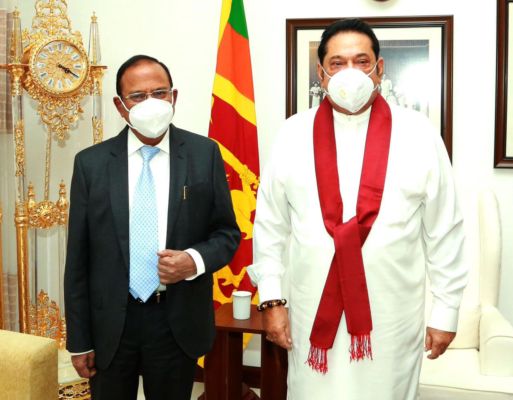The recent visit of National Security Adviser, Ajit Doval to Sri Lanka for trilateral security talks, which also included Maldives, has triggered ripples in China — a country that is competing with India for dominating South Asia.
Sohu.com, a Chinese news website has pointed out in a recent article that the region has become a cockpit of geopolitical rivalry among “great powers”. It spotlighted that Doval’s visit sought to accomplish three objectives.
First, New Delhi and Colombo agreed to accelerate infrastructure projects. India and Japan — a country that is New Delhi’s key partner in the Indo-Pacific, will jointly develop and operate the eastern container terminal at Colombo port. It cited Sri Lanka's Ministry of Commerce, a saying that the three parties will set up a terminal operating company to carry out all operations, with Sri Lanka holding 51% of the shares, India with 15%, and the remaining with joint venture partners.
The move will balance China, which has already been entrusted to a Chinese company is operating an international container terminal at the port of Colombo, adjacent to the eastern container terminal. Indian shippers — Sri Lanka’s largest customers — use Colombo as a trans-shipment centre, accounting for 80 per cent of Colombo's throughput. But Chinese influence over Colombo port has been a cause of anxiety in India, triggering a joint counter-move by India and Japan.
Second, during Doval’s visit India, Sri Lanka and Maldives agreed to set up a maritime security Secretariat in Colombo to coordinate maritime security plans. The move has geostrategic implications. “The Secretariat is considered vital by India because India wants to take the opportunity to control the Indian Ocean,” the website said.
The website also noted that during his stay, India’s National Security Adviser met a top a Sri Lankan ethnic Tamil leader and discussed solutions to unresolved Tamil issues.
Read also: In a snub to China, Bangladesh turns its back on Chinese Defence Minister
Doval also met the Sri Lankan President Gotabaya Rajapaksa, who expressed interest in seeking Indian investments, rather than loans. Analysts in India point out that Sri Lankans are wary of loans as they have already fallen into a debt trap with China, because of excessive indebtedness. In building Sri Lanka’s infrastructure, India is partnering with Japan, as part of Indo-Pacific strategy, which includes Australia, Japan and the United States as core partners.
In the great game for influence in the strategically located island nation, China has launched its Maritime Silk Road, which is competing with the four nation Indo-Pacific initiative.
In the region, China has already developed a deep-water port in Kyaukphyu in Myanmar in the Bay of Bengal. It also runs the Hambantota port in Sri Lanka, and has identified the coastal city of the Gwadar in Pakistan as its gateway to the Arabian sea. Besides, China has established a military base in Djibouti on the mouth of the strategic Gulf of Aden.
In a bid to expand its influence in the Indian Ocean, India has identified the Omani port of Duqm as an outpost for defence cooperation. Besides, it has arrived at an understanding with Seychelles, which can help expand the Indian navy’s footprint.
With China in mind, the US Secretary of state, Mike Pompeo had recently visited Bangladesh, Sri Lanka and Maldives to draw the three strategically located nations into the Indo-Pacific strategy, and counter China’s Maritime Silk Road.




















